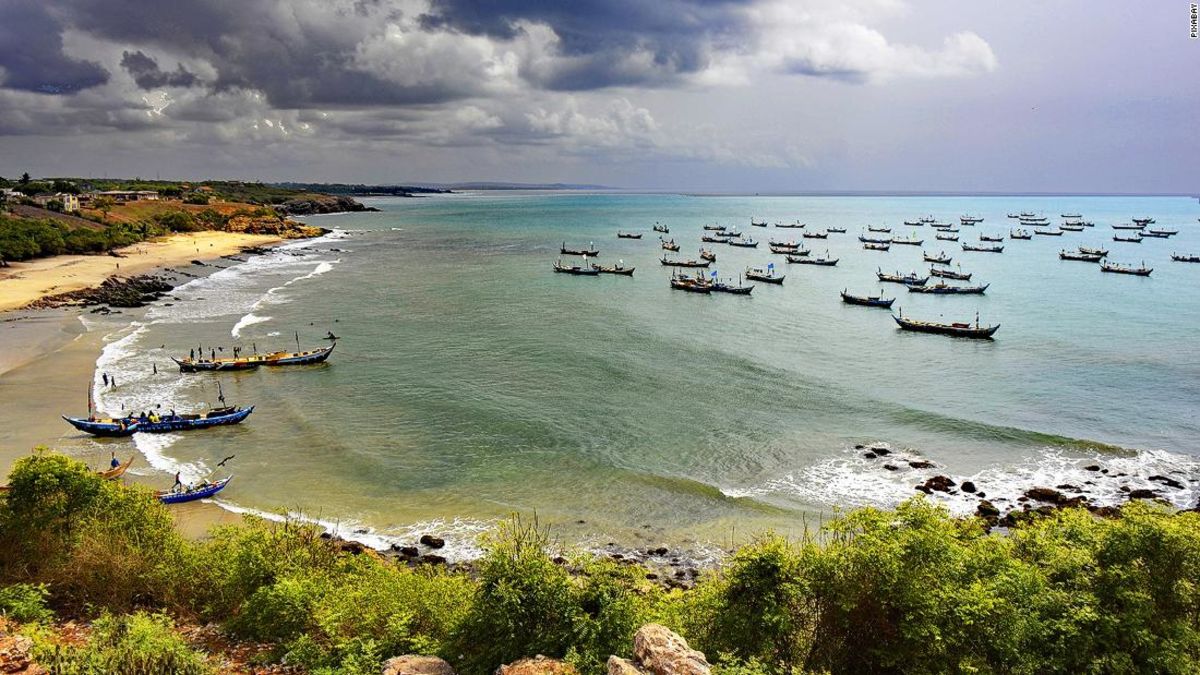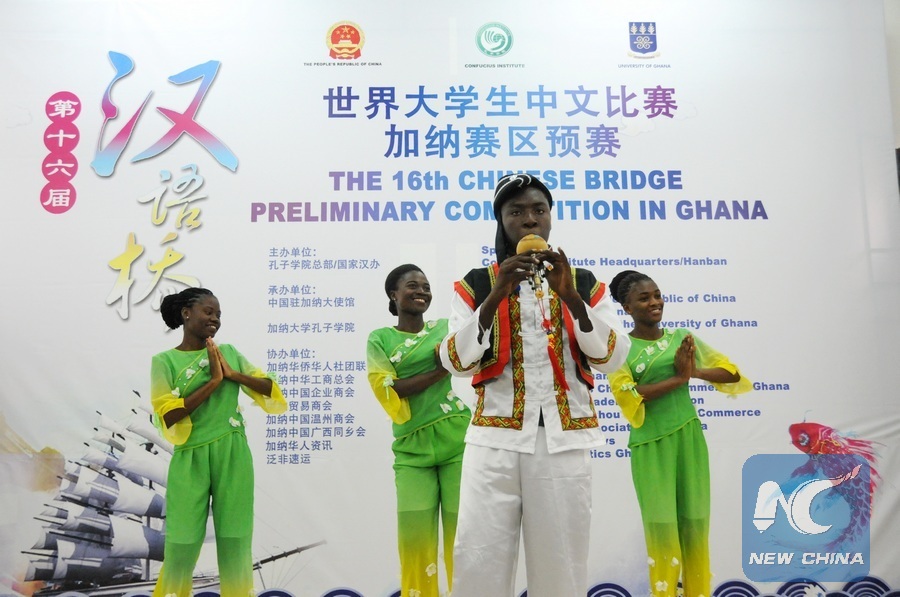Facts
Official name: Republic of Ghana
Area: 239,567 square km
Capital: Accra. It’s the largest city of Ghana, covering an area of 225.67 square km with an estimated urban population of 2.27 million as of 2012. The city is also the Greater Accra Region's economic and administrative hub, and serves as the anchor of the larger Greater Accra Metropolitan Area.
Population: 28,308,301 (2016).
GDP: $211.127 billion (2019 estimate)
GDP per capita: $6,998 (2019 estimate)
Official languages: English
Major religion: Ghana is a largely Christian country, although a sizable Muslim minority exists. Traditional (indigenous) beliefs are also practiced.
Currency: Ghanaian cedi
President: Nana Addo Dankwa Akufo-Addo (since January 2017)

Geography
Ghana is located on the Gulf of Guinea, only a few degrees north of the Equator, giving it a warm climate. Ghana spans an area of 238,535 square km, and has an Atlantic coastline that stretches 560 kilometers on the Gulf of Guinea in the Atlantic Ocean to its south.
Ghana encompasses plains, waterfalls, low hills, rivers, Lake Volta, the world's largest artificial lake, Dodi Island and Bobowasi Island on the south Atlantic Ocean coast of Ghana. The northernmost part of Ghana is Pulmakong and the southernmost part of Ghana is Cape Three Points.
The climate of Ghana is tropical. The eastern coastal belt is warm and comparatively dry, the south-west corner of Ghana is hot and humid, and the north of Ghana is hot and dry.
Economy
Ghana is an average natural resource enriched country possessing industrial minerals, hydrocarbons and precious metals. It is an emerging designated digital economy with mixed economy hybridization.
It has an economic plan known as the "Ghana Vision 2020." This plan envisions Ghana as the first African country to become a developed country between 2020 and 2029 and a newly industrialized country between 2030 and 2039.
Ghana's economy also has ties to the Chinese yuan along with Ghana's vast gold reserves. In 2013, the Bank of Ghana began circulating the renminbi throughout Ghanaian state-owned banks and to the Ghana public as hard currency along with the national Ghana cedi as a second national trade currency.
Ghana also produces high-quality cocoa. It is the 2nd largest producer of cocoa globally. Ghana is classified as a middle income country. Services account for 50% of GDP, followed by manufacturing (24.1%), extractive industries (5%), and taxes (20.9%).
The Ghana economy has an increasing primary manufacturing sector. It exports digital technology goods along with assembling and exporting automobiles and ships. It exports industrial minerals, cocoa and other agricultural products, petroleum and natural gas, and information and communications technology primarily via Ghana's state digital technology corporation Rlg Communications, which manufactures tablet computers, smartphones and various consumer electronics.
Ghana produces and exports an abundance of hydrocarbons such as sweet crude oil and natural gas. Known for its industrial minerals, Ghana is the world's 7th largest producer of gold; producing over 102 metric tons of gold annually.

Ghanaian student Sammuel M.Okoe-Mensah (Front) plays the cucurbit flute with his partners in the "Chinese Bridge" language proficiency competition in Accra, capital of Ghana, on April 7, 2017.(Xinhua/Shi Song)
Education
The Ghanaian education system is divided in three parts: Basic, secondary and tertiary education. Basic education lasts 11 years (ages 4‒15). It is divided into kindergarten (2 years), primary school (2 modules of 3 years) and junior high (3 years). Junior high school (JHS) ends with the Basic Education Certificate Examination (BECE).
A bachelor's degree usually lasts 4 years, and can be followed by a 1- or 2-year master's degree, which can be concluded in 3 years by a PhD. A polytechnic degree lasts 2 or 3 years. Ghana also possesses numerous colleges of education. The Ghanaian education system from kindergarten up to an undergraduate degree level takes 20 years. The academic year usually goes from August to May inclusive. The school year in primary education lasts 40 weeks in Primary School and SHS, and 45 weeks in JHS.
With over 95% of its children in school, Ghana currently has one of the highest school enrollment rates in all of Africa. Ghana's education system annually attracts a large number of foreign students, particularly in the university sector.
Media
The private press is lively, and often carries criticism of the government. Lively phone-in shows are staple fare on many radio stations. State-run Ghana Broadcasting Corporation (GBC) runs national TV and radio networks. By 2016, 8 million Ghanaians were using the internet, around 28% of the population (Internetlivestats.com). Mobile phones are widely used for online access.
Health
Ghana has a universal health care system strictly designated for Ghanaian nationals, the National Health Insurance Scheme (NHIS). Health care is very variable throughout Ghana and in 2012, over 12 million Ghanaian nationals were covered by the National Health Insurance Scheme (Ghana) (NHIS). Urban centers are well served, and contain most of the hospitals, clinics, and pharmacies in Ghana. There are over 200 hospitals in Ghana and Ghana is a destination for medical tourism.
In 2017, life expectancy at birth had increased to an average of 67 years with males at 64.5 years and females at 69.6 years, and in 2013 infant mortality decreased to 39 per 1,000 live births. There was an estimation of 15 physicians and 93 nurses per 100,000 persons in 2010. 5.2% of Ghana's GDP was spent on health in 2010, and all Ghanaian citizens have the right to access primary health care. As of 2012, the HIV/AIDS prevalence was estimated at 1.40% among adults aged 15–49.
Bilateral ties
On July the 5th, 1960, right after the founding of the Republic, Ghana immediately established diplomatic relations with China, thus becoming one of the earliest sub-Saharan countries recognizing the New China.
Ghana, together with other developing countries, helped China resume its legitimate seat in the United Nations in 1971.
China and Ghana have been good partners over the past several decades for national development with collaboration on various aspects by helping each other in their social-economic transformation. Since the establishment of the China-Africa Cooperation Forum in 2000, economic cooperation between the two countries has been growing at a fast pace. In 2009, China-Ghana bilateral trade exceeded $ 1.6 billion, and the number of projects undertaken by Chinese enterprises tops the list in Ghana, amounting to about 400.
The bilateral trade between China and Ghana registered $7.25 billion in 2018, making it the seventh-largest trading partner of China in Africa. Ghana's exports to China also increased significantly by 31.8 percent to $2.44 billion in 2018 to maintain a two-digit annual performance since 2010, except in 2016.
President Xi Jinping held talks with Ghana's President Nana Akufo-Addo who was on a state visit to China on Sep 2, 2018, and the two leaders agreed to inject new vitality into and further enrich the bilateral relations. Akufo-Addo also attended the 2018 Beijing Summit of the Forum on China-Africa Cooperation between Sept 3 and 4.
China handed over a completed 300-village satellite TV project to Ghana on May 19, 2019. The completion of the project, according to Ghana's Deputy Minister for Communications George Andah, was another step in the strengthening of the strong relations between Ghana and China.


